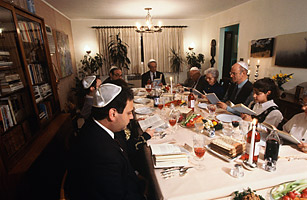
The first night of Passover is thought to fall on the 15th day of Nisan, according to the Hebrew calendar, which is when the new moon rises and spring begins. But the date was originally based on the lunar cycle, which created a slightly different clock for Jews outside Israel when the tradition was instituted more than 2,000 years ago. Authorities in Jerusalem handed down the annual date, but it took days on end for the official word to spread throughout the world. In an effort to ensure that the international Jewish community didn't miss the crucial seventh day of Passover, which commemorates Moses' iconic parting of the Red Sea, an eighth day was added to the celebration, in case the new moon's rising had been miscalculated.
While modern calendars and communication methods have cleared up all potential confusion, Yom Tov Sheni, roughly meaning "the second day of the holiday," is still celebrated abroad in the Orthodox and Conservative traditions when a second feast is held. The Reform Judaism community abolished the eighth day in 1846, as improved communication methods made it redundant.